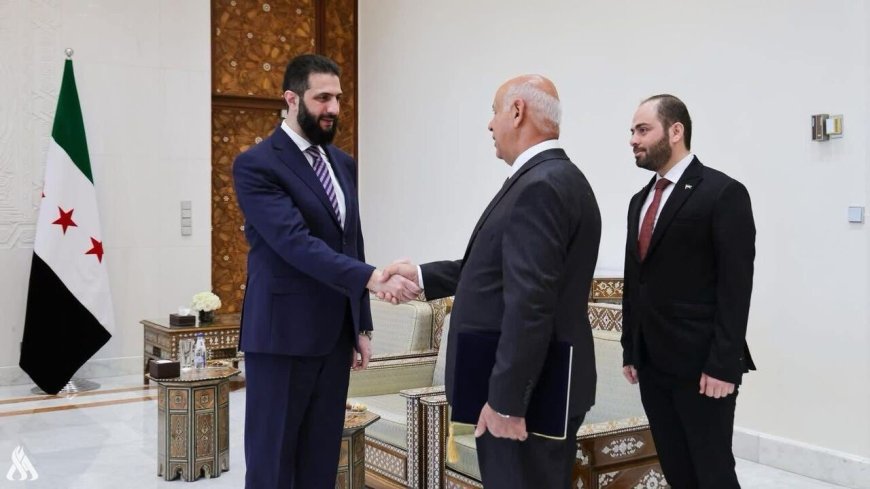From Blacklist to Guest List: Iraq's Bold Move with Jolani
The upcoming Arab League summit in Baghdad is unfolding under the shadow of a seismic regional shift: the fall of Bashar al-Assad’s government in Damascus and the military-administrative takeover of much of Syrian territory by Hay’at Tahrir al-Sham. Against this backdrop, reports of a formal Iraqi government invitation extended to Ahmad al-Sharaa (a.k.a. Abu Mohammad al-Jolani) to attend the summit have ignited a wave of political controversy in Baghdad.

The upcoming Arab League summit in Baghdad is unfolding under the shadow of a seismic regional shift: the fall of Bashar al-Assad’s government in Damascus and the military-administrative takeover of much of Syrian territory by Hay’at Tahrir al-Sham. Against this backdrop, reports of a formal Iraqi government invitation extended to Ahmad al-Sharaa (a.k.a. Abu Mohammad al-Jolani) to attend the summit have ignited a wave of political controversy in Baghdad.
This move comes as Iraq positions itself as a hub of regional diplomacy and a key player in shaping the emerging post-Assad order in Syria. Yet, the invitation has provoked intense domestic backlash, particularly from Iraqi Shia factions, plunging Prime Minister Mohammed Shia’ al-Sudani’s government into a compounded challenge of internal security and foreign policy management.
With Assad’s regime crumbling, Arab leaders and regional powers are recalibrating their stance toward the new authority in Damascus. Hosting this year’s summit, Baghdad has taken a bold step beyond the traditional Arab consensus by sending an invitation to Jolani, the leader of HTS. Observers view this not merely as a diplomatic maneuver but as an overture toward normalizing ties with Syria’s emergent power structure.
Iraq, maintaining strong ties with both the United States and Iran, has long sought to act as a regional mediator. It previously hosted talks between Saudi Arabia and Iran before their rapprochement. For some Iraqi and regional stakeholders, inviting al-Sharaa is seen as a way to elevate Baghdad’s status as a diplomatic power broker.
However, the decision has drawn fierce condemnation from Shia factions. The Coordination Framework, the Islamic Dawa Party, and top commanders in the Popular Mobilization Forces (PMF) have all denounced the move, warning of grave political and security consequences.
Over 50 Iraqi MPs have signed a petition urging the Speaker of Parliament to block Jolani’s entry. Some lawmakers have even called on the judiciary to intervene and prevent his visit.
In a formal statement, former Prime Minister Nouri al-Maliki declared: “While we recognize the fall of Assad’s regime as a complex event influenced by international power dynamics, legitimizing a group with al-Qaeda roots and inviting its leader to an official Arab League summit is an affront to the collective memory of Iraq’s terror victims.”
Shia MP Yousef al-Kalabi stated that allowing Jolani into Iraq would be “a betrayal of the memory of Iraqis who suffered under terrorism.”
Ahmad al-Sharaa, known as Abu Mohammad al-Jolani, rose to prominence as a leading figure in al-Qaeda in Iraq after the U.S. invasion in 2003. He has been implicated in numerous attacks and bombings that killed large numbers of Iraqis.
Some Iraqi security officials have warned of pre-emptive measures to preserve national security if Jolani sets foot in the country. Sources have revealed that an outstanding arrest warrant for Jolani remains active in Iraq’s judicial system, although the central government may invoke the summit’s "diplomatic immunity" clause to prevent its enforcement.
Sunni groups remain divided. Some, like former MP Mishaan al-Jubouri, have voiced support for al-Sharaa, downplaying his past and framing his visit as a diplomatic necessity. Jubouri and others argue that Iraq should prioritize its regional interests—especially ties with Syria—over historical grievances.
Conversely, Sunni tribal leader Sheikh Muzahim al-Huweit from Nineveh has categorically rejected al-Sharaa’s visit. While supportive of trade and security cooperation with Syria, al-Huweit denounced Jolani as a figure deeply intertwined with Iraq’s violent past.
Al-Huweit’s opposition is rooted in both Jolani’s personal history and the broader implications of hosting a former militant commander. “We reject Jolani’s visit because his hands are stained with Iraqi blood. He has openly admitted to participating in operations in Iraq after being released from U.S. custody—where he was imprisoned in 2005 and shared a cell with me. He still faces charges under Iraq’s anti-terrorism law (Article 4), issued by the judiciary and counterterrorism authorities. His visit is unacceptable,” he said.
As for Sunnis who welcome Jolani, al-Huweit remarked:
“Those who embrace him—be they political figures or tribal elders—are participants in disgrace and dishonor. They do not represent the Sunni community; they represent only themselves.”
Despite the uproar, the Sudani government has neither confirmed nor denied Jolani’s attendance. Sources close to the Prime Minister’s office say multiple scenarios are under review, including the possibility of Jolani addressing the summit remotely via video conference.
In sum, the invitation extended to Jolani represents a daring attempt to engage with the emerging Syrian reality—but one fraught with internal risks. Should Jolani attend, it would mark the first time a non-state, Islamist militant leader formally participates in an Arab League summit.
This moment may herald a new chapter in regional politics, one in which the lines between state and non-state actors are increasingly blurred. For Iraq, the challenge lies in balancing geopolitical pragmatism with deep-seated domestic sensitivities.
Whether Jolani ultimately travels to Baghdad or not, the invitation alone has already fractured Iraq’s political landscape. The decision may not only reshape Iraq’s relationship with Syria, but also define its diplomatic trajectory in a region characterized by volatility and shifting allegiances.
Translated by Ashraf Hemmati from the original Persian article written by Mohammad Saleh Ghorbanie













































